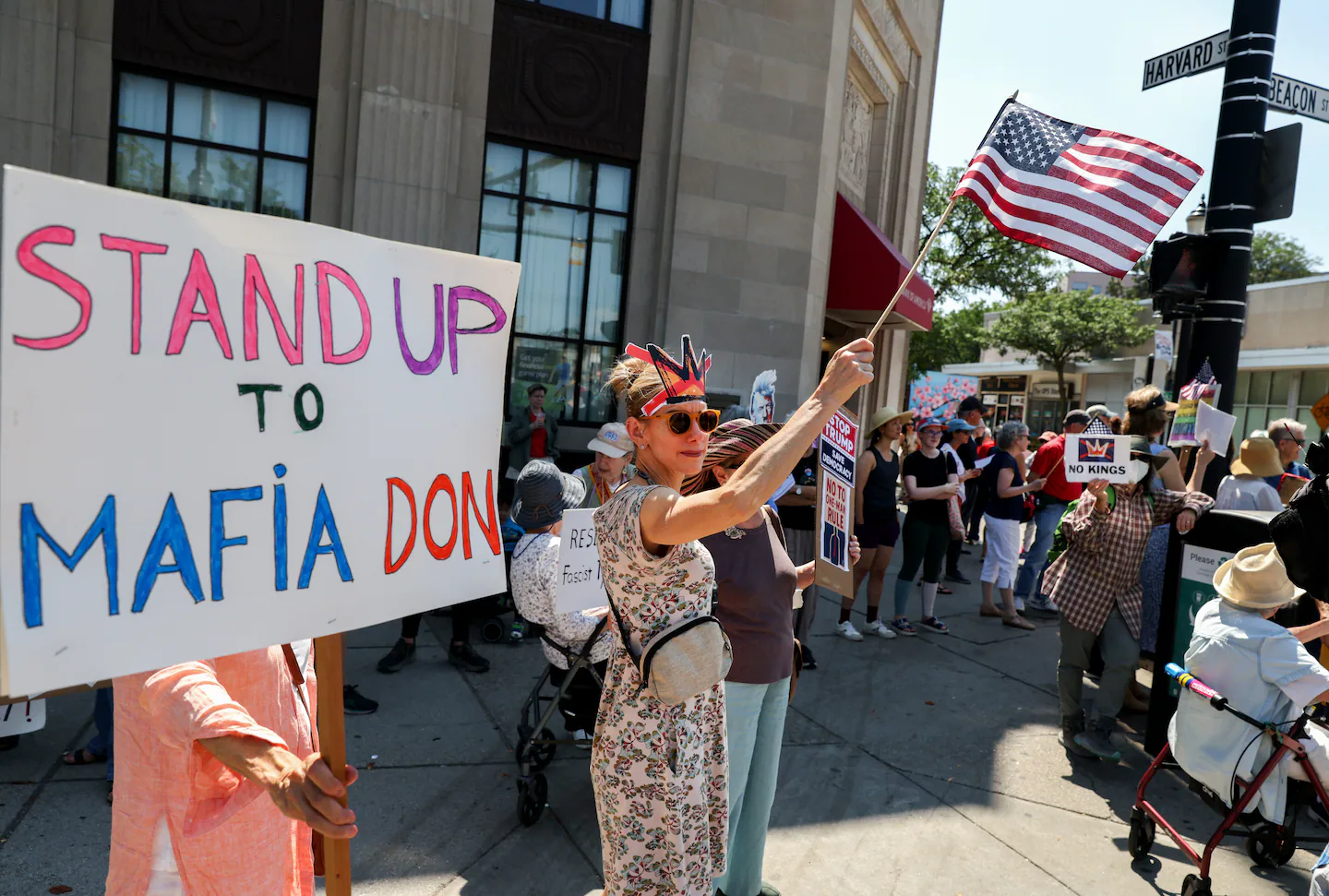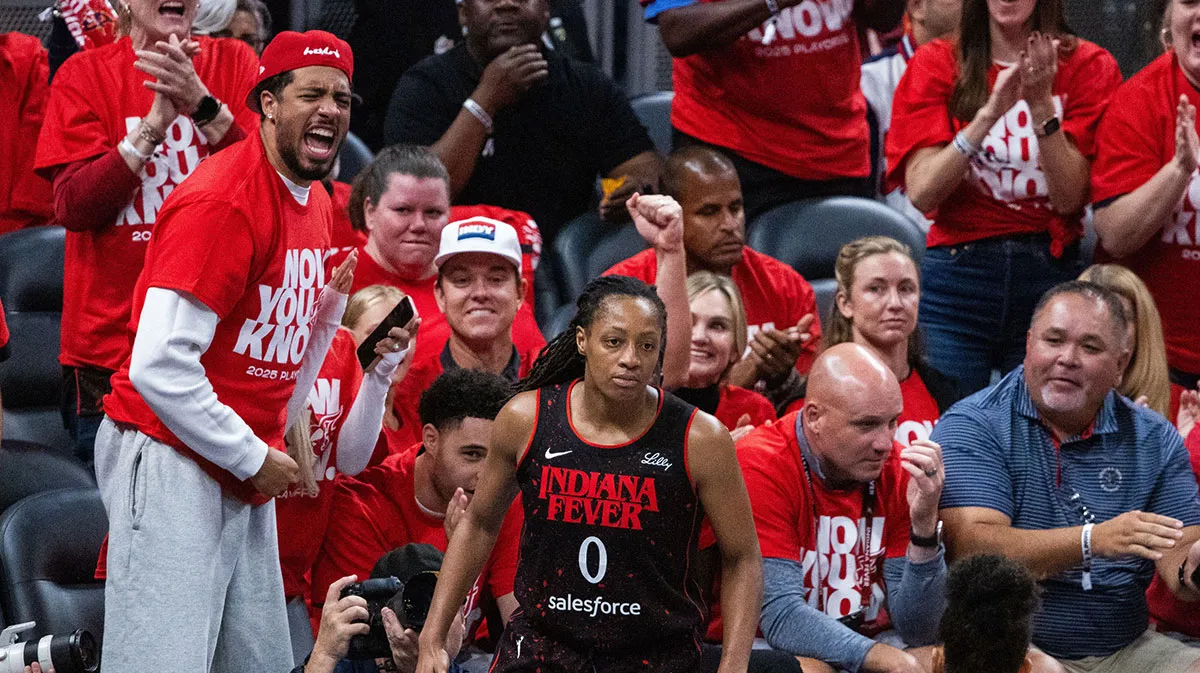
“I’m 90 years old. I’m thinking about the future, my grandchildren, and any potential great-grandchildren,” Manasse said. “I’m wondering: What kind of world are we bringing these children into?”
The group, most of whom met at a senior residence, call their gatherings “Rally for Democracy.” Seniors coming out to protest isn’t just limited to Brookline. Across the country, older Americans are rallying against the federal government, reshaping an activity that people tend to associate with the youth. Many are grandparents who see organizing as a way to secure a better future for their children. Some protested the Vietnam War in the 1960s, while others were partaking in civil disobedience for the first time.
The turnout of seniors is striking for an age range that tends to lean conservative. For registered voters aged between 60 to 69, the percentage who identify as Republican is 53 percent, according to the Pew Research Center. For those aged 70 to 79, that number is 51 percent, while 58 percent of voters above the age of 80 align themselves with the Republican Party.
Older Americans coming out to protest the Trump administration are also facing backlash from national figures. After the federal takeover of Washington D.C., White House advisor Stephen Miller slammed protesters and dubbed them “elderly white hippies” in August. It’s a disparaging title, but one that the Brookline seniors have embraced.
“I’m an old white hippie. That’s reality,” said Barr Jozwicki, 79, with a chuckle.
The professional sculptor, from Brookline, who wore a ten-gallon hat, denim shirt, and scruffy white beard, is no stranger to protest. As a kid, it was Joseph McCarthy. Then, it was the Vietnam War. And now, Trump.
“I feel like a kid again,” Jozwicki said. “I did this 60 years ago, and I’m here today, because it’s the same as 60 years ago.”
No matter the time or place, he’s always been drawn to the sense of unity that comes along with protesting. He held a poster that read “Honk to stop Trump,” spelled out in duct tape. He looked around, taking in the scene: the beeping of the cars, pedestrians waving hello, and the trumpet blaring from across the street.
“He’s my poker buddy,” Jozwicki said of the trumpet player, a fellow senior protester.
Across the country, seniors list several reasons why they’re protesting Trump. Some policies affect them directly, like cuts to Medicaid. On this recent Saturday afternoon, freedom of speech was the hot topic, with the slew of firings and Jimmy Kimmel’s suspension after Charlie Kirk’s death at the forefront of minds.
But one issue seemed to stick with the Brookline seniors: immigration.
Organizer Stephanie Schoen, 78, said she was especially disturbed by the Trump administration’s family separation policy, implemented from 2017 to 2018. The “zero tolerance” approach led to children being split from their parents during the detention process, and some children went into foster care while their parents were held.
“I was thinking about my grandchild possibly being separated,” Schoen said. “I just felt it.”
Schoen didn’t have much experience with protesting before Trump took office. But, after feeling “upset, depressed, and anxious” at the start of his first term, she started taking her “little, tiny steps into activism.” Then, she threw herself into grassroots activism, and it became a part of her daily routine all throughout Trump’s presidency.
As she and the Brookline group look ahead, they’re hoping to make their rallies multi-generational.
“We’re sort of trying to deemphasize the seniors part and trying to get younger people, but they don’t seem to be coming yet,” Schoen said.
Partnerships between senior and younger activists may face challenges, said Gary Fine, a sociology professor at Northwestern University, who studies senior activism. While conducting field research, he found that some senior activists were appalled when younger activists asked for their pronouns.
“It’s a reminder that issues that young progressive people care about, older progressive people don’t care about or find silly,” Fine said.
Protests that span across age groups would need to take seniors’ physical limitations into account, affecting the time marches happen and the duration of marches. Protests need to be accessible for older people who don’t drive, like near an MBTA station, and near bathrooms, Fine added.
“[Ideally, younger activists] would be working with seniors to ensure that this is a protest that the group would find appealing,” Fine said.
But no matter the demographics of a protest, coming out will always be important to push for change, because “you can’t live in the past,” said Annette Manasse.
While civil disobedience will stick around, the pop culture references are moving too fast. Manasse can’t keep up.
“Do I go to Taylor Swift concerts? Ariana Grande? I don’t even know who these people are,” Manasse said. “I don’t know the language. I don’t know the slang.”



